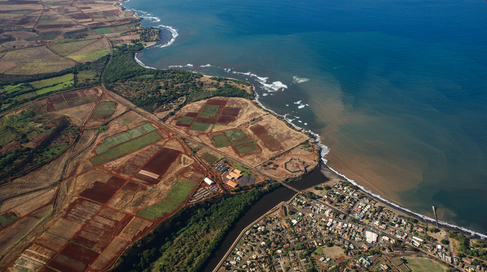The chemical industry’s experimentation with pesticide-promoting genetically engineered (GE) crops increasingly threaten Hawaii’s public health, biodiversity and food independence. To curb these threats and raise public awareness about this issue, HCFS has published the groundbreaking, in-depth report Pesticides in Paradise: Hawaii’s Health and Environment at Risk.
Download the key findings
Download the Executive Summary
Download the abridged report
Download the full report in English or Japanese
Digital Resource Library
Annotated Bibliography
Download the infograhic - The Hidden Truth Behind Pesticide-Seed Companies in Hawai‘i
Download the infographic - Pesticides in Paradise: Human Health at Risk
Download the Frequently Asked Questions
On Oahu, Kauai, Maui, and Molokai, chemical and biotechnology companies Monsanto, Syngenta, DuPont-Pioneer, Dow Chemical, and BASF have purchased prime agricultural land, taking advantage of Hawaii’s isolation and year-round growing season, in order to field test crops that have been genetically engineered to withstand greater applications of pesticides.
Hawaii is a relatively small state, but has one of the highest rates of open-air GE field tests in the U.S - in 2014, chemical companies conducted GE field tests on over 1,381 sites. Herbicide resistance has been the most frequently tested trait over the past five years. This means GE crops tested in Hawaii, by and large, are designed to withstand ever greater applications of herbicides, posing a direct threat to human and environmental health..
Pesticide drift is a primary concern for communities living alongside GE operations. In the report, HCFS reviews over 150 published scientific and medical research examining the threats pesticides used in Hawaii pose to public health, especially the risk to pregnant women and young children. The findings reveal that pesticide exposure in utero and early life has been linked to childhood cancers, neurobehavioral and cognitive deficits, adverse birth outcomes, and asthma.
Neither pesticides nor GE crops are adequately regulated in the state of Hawaii, and this report is a major advancement in efforts to establish stronger regulations that protect Hawaii’s people and natural resources from harmful exposure to pesticides.
Read the abridged version of “Pesticides in Paradise: Hawaii’s Health & Environment at Risk”
As a resource for communities across the islands, HCFS is offering free presentation of the report’s key findings, and we encourage you to sign-up for a presentation in your neighborhood or for your organization - Sign up here.




